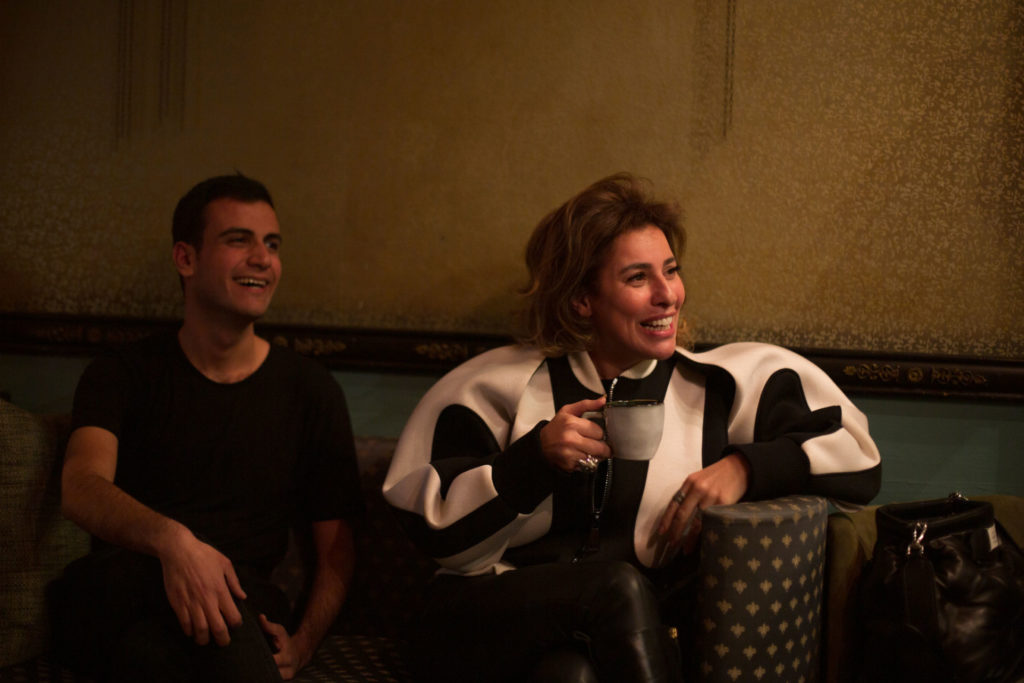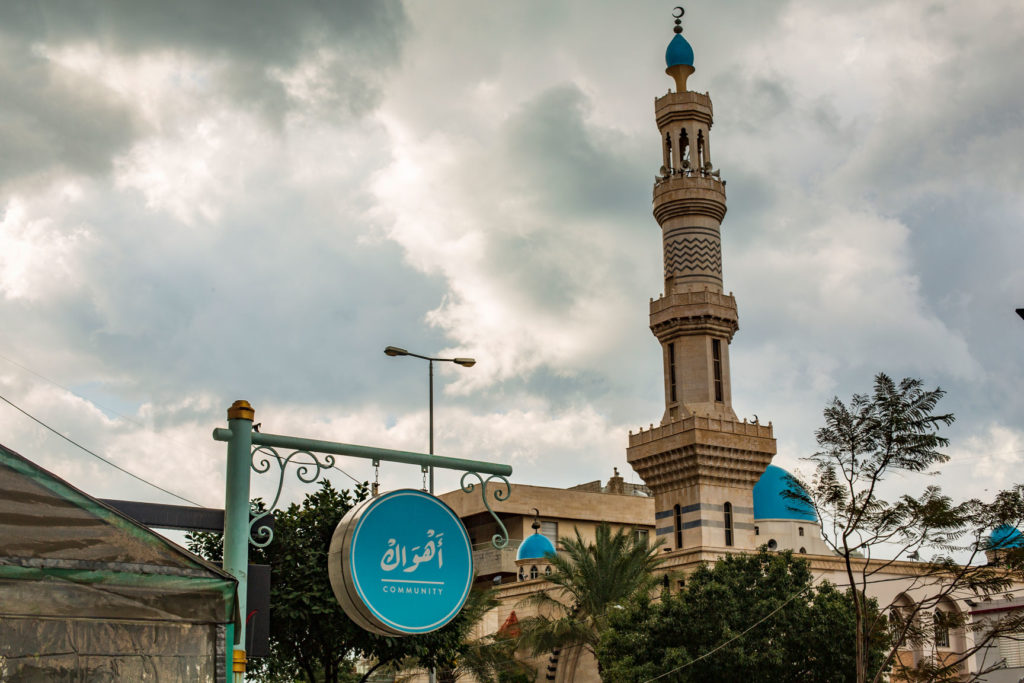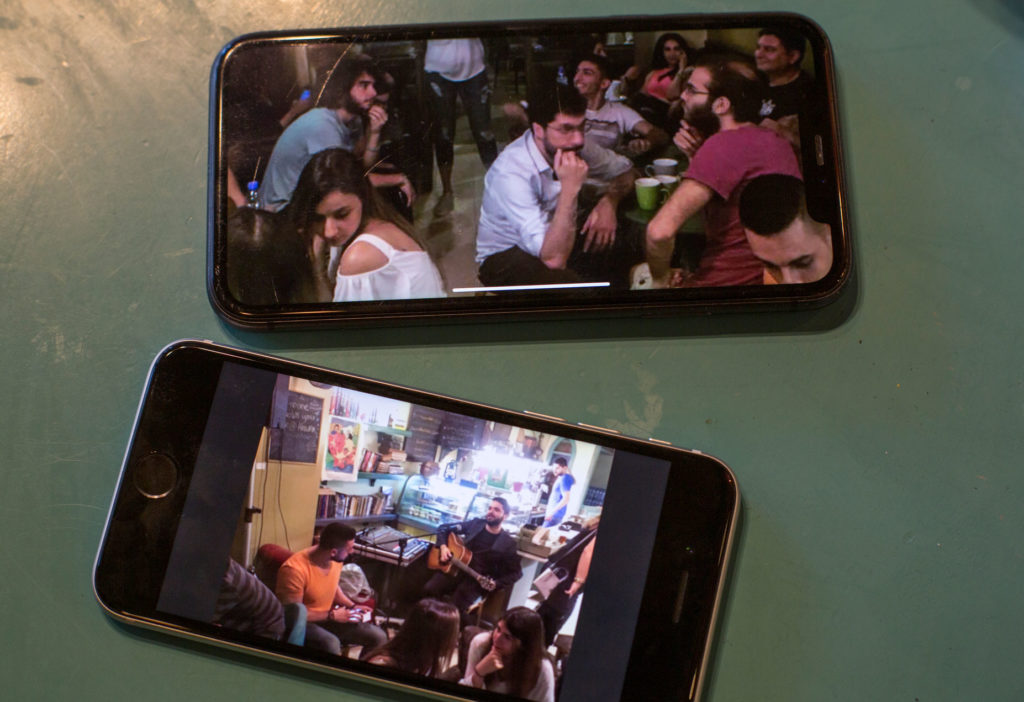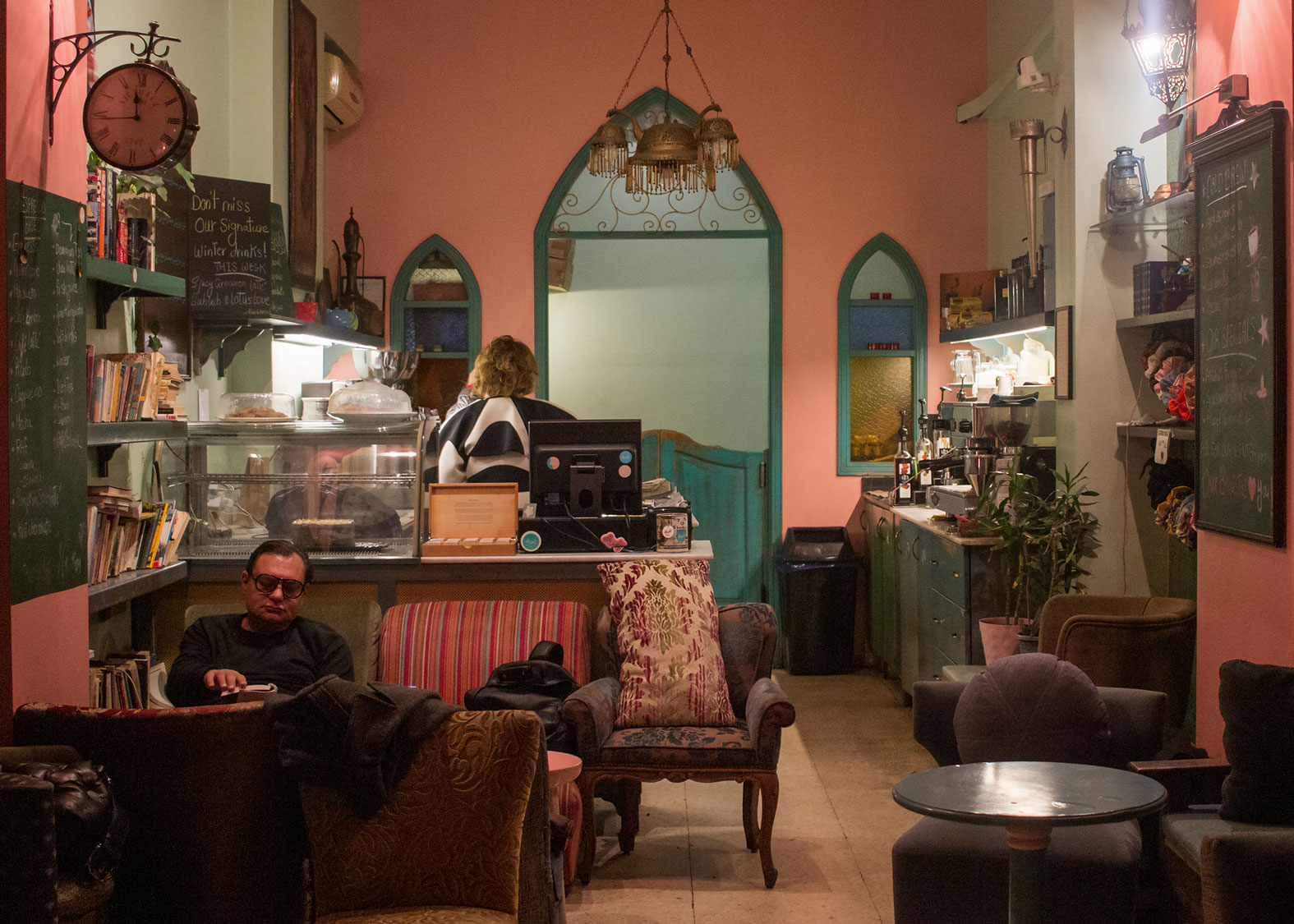It would be easy to walk past Ahwak Community Café, brushing it off as another attempt at a European-style neighborhood coffee shop. But there is more to Ahwak than the coffee it serves.
Behind its turquoise door is a hideout for a small community of Tripolitans who are striving for cohesion and creativity in a city alienated by political corruption, violence, insecurity and religious divisions.
Located in the unassuming commercial area of Dam w Farez, within throwing distance of Sahet al-Nour, Tripoli’s central square, Ahwak and its community constitute an overlooked part of the city — a place where liberals, conservatives, Muslims, Christians, atheists, artists, intellectuals, LGBTQ people, the young and the old, can talk and drink together.
It is an antidote to Tripoli’s troubles, conspicuous in a city infamous for poverty, the ebb and flow of fundamentalism, and home to some of Lebanon’s wealthiest politicians, including caretaker Prime Minister Najib Mikati.
Inside is a homely, salon-style room; the walls are pink or papered with gold print, sofas and armchairs fill the floor, while a medley of round tables hold cappuccinos and espressos. The colorful space reflects the eclectic clientele who, since 2008, have relished the atmosphere created by Ahwak’s owner, Sahar Minkara.
Minkara is perched on a sofa sipping a cafe blanc, a hot drink scented with orange blossom, as she recounted the days her fragmented city united for the first time during Lebanon’s October 2019 revolution.

“It was a big moment for us,” she said. “There were people smoking marijuana on the square. … There were young boys holding rainbows. They were dancing to techno [music] under the Allah sign [in the middle of the square].”
For a few months, sects, gender and class were forgotten, and the country erupted in furor against a decades-old, corrupt and incompetent ruling class. “We were so oppressed in the city. Everyone is so oppressed,” Minkara said.
For years, Lebanon’s northern capital has embodied the country’s troubles. It has endured occupations and conflict, repelling investment and opportunities, leaving its residents feeling forgotten. Minkara is one of them, yet not due to deprivation or unemployment, but because she is speaking up for a community others want to silence.
“What you are seeing today in Tripoli is way more conservative than the Tripoli I grew up in,” she said.
Born and raised in the city, Ahwak’s 47-year-old proprietor defies the typical expectations of a Tripolitan woman. Not only is it unusual to have a female-run coffee shop, but with her black leather pants, monochrome bomber jacket and wave of freshly pouffed hair, she also counters Tripoli’s conservative image.
“[The city has gone] backwards at a huge speed. My generation sees this immensely. We were the last generation who saw the city in both cultures … who saw the diversity of the city.”
After returning from a year in Australia during the 2006 Israel-Lebanon war and seeing the city’s neglected state, Minkara felt energized to create something positive. From friends emigrating, to villagers from rural areas seeking work in the city, everyone was searching for better opportunities, while regional instability also meant that Tripoli became host to different ethnic groups. The dynamic of the city was evolving but with little prosperity, she explained. “I saw the start of a declining city, and I thought, I need to make a platform for somebody, and I need to push it culturally.”
Minkara wanted to re-create a pocket of the past Tripoli, the cosmopolitan society that shaped her childhood. She was also inspired by the historic prominence of coffee: “I think coffee shops have always played huge roles in societies — whether it was the Industrial Revolution, the early 1920s, ’30s, [Jean-Paul] Sartre … coffee shops are a platform where everyone can speak.”
In Lebanon, coffee is on every street corner. It is found on the backs of motorbikes, steaming out from a neat machine, or in Turkish copper dallah pots, lugged by a fez-donning old man clinking his cups to catch passersby. It is so integrated into the morning routine of what’s known as “sobhiye”: gossiping with friends or neighbors over coffee.
With the rise of Egyptian President Gamal Abdel Nasser’s pan-Arabism in the 1950s, Tripoli’s coffee rooms became Arab nationalist havens. Local men gathered around the old quarters of Tal square to drink coffee, smoke cigarettes and dissect Lebanese President Camille Chamoun’s pro-Western, Christian outlook. The rooms have survived the ravages of time with the same plastic chairs, checkered brown tiles, smoke-stained walls and large analog clocks.
Like its predecessors, Ahwak also grew into a coffeehouse of debate and ideas, but with an edge. Customers nurtured an atmosphere of free thinking, culture and, ultimately, fun.
“First, it was a big hit,” Minkara said of Ahwak’s early years. “I got to attract a beautiful community of creative people; open-minded, youngsters, [the] super creative, musicians. The LGBTQ-plus [community] as well, not because I was like putting a rainbow on the front [of the shop]. But because here, nobody was judged, everybody was free to do anything.”
Ahwak molded to its patrons: One evening it would be a music venue, the next day, a library. Minkara made a point to promote young artists, holding exhibitions and attracting local press, as the sounds of late-night revelry became one with the community.
“I had veiled women coming here, I had somebody who would come, cover his coffee, go to the mosque opposite, pray and then come back,” she said. “And even we had a sheikh, Raheem, who used to come here, and he was very nice. … He used to sit here and see me drinking beer and open conversations with me,” Minkara remembered.
Yet as the cafe became a magnet for the city’s young people, it attracted suspicion from the wider community, including the mosque across the street. Ahwak garnered an array of nicknames, like “the coffee shop for gays and sluts,” and the “safara,” the Arabic word for embassy, a reference to all the foreigners who frequented the cafe.
Minkara eventually found herself face-to-face with the wrath of the sheikh from the mosque opposite Ahwak.

One evening during Ramadan in 2017, as the adhan boomed from the minaret, the power cut, as is common under Lebanon’s fragile electricity network. Ahwak was immediately blamed.
“They thought I came and cut the wires,” Minkara said. A backlash erupted on social media, and an anonymous Islamic group, who called themselves the “Propagation of Virtue and the Prevention of Vice,” threatened Minkara, ordering her to shut down Ahwak and evacuate the city within 24 hours.
Undeterred, she grabbed the phone and called the sheikh. “I told him, ‘If anything happens to me or to my clients, I’m going to sue you.’ And I did,” she said. Local politicians became involved, who were “all very supportive,” while the army stationed a tank between the mosque and Ahwak.
The next day, high on rebellion, Minkara dressed in “the shortest crop top with the tightest jeans and the highest heels” and sat outside Ahwak, in full view of the mosque.
“I remember the beautiful thing, the next day after the incident, the whole community came to support, they were sitting all over the coffee shop. People came in solidarity, people who hadn’t come for years,” she said.
Tripoli is majority Sunni, but it is also home to a small Christian community, Alawites, and a number of displaced Syrians, Palestinians and Iraqis. Some fear the city has been undergoing Islamification because of the increasing reach of Sunni political and religious authorities in recent years, which some believe has cultivated an insular and watchful atmosphere.
The diverse demographic has led to tensions. During the summer of 2013, hostilities from Syria’s civil war spilled over the border, and the city was engrossed in daily clashes between warring Sunni and Alawite neighborhoods.
The city was on edge, but day-to-day business continued, and Ahwak was packed with patrons each evening.
However, one evening, three men dressed in black and wielding guns barged into the busy cafe and accused Minkara of serving alcohol. “And you know what they did?” she said, acting out someone nudging her elbow with a gun. They grabbed the bottles of coffee syrup and started sniffing them: “They were saying, ‘Is this alcohol?’”
“To be honest, I was scared,” she admitted.
“They are always trying to break people like Sahar and me,” said Khaled Merheb, one of Ahwak’s earliest customers, referring to the city’s religious conservatives. “Because we talk without gloves, without consequences.”
Merheb, a 51-year-old openly gay human rights lawyer and activist, is accustomed to defamatory rumors and gossip.
“This is a conservative city. … I’m very liberal, I’m pro-gay rights, I’m pro-women’s rights, I’m pro-children’s rights. … And I’m very vocal about it, I’m not ashamed,” he said.
He gained critics after once defending gay rights on television and lost work because of it.
“I don’t care because I’m a person who does what they want to,” he said.
It is thanks to Ahwak that Tripoli’s gay community has a place to meet without fear of judgment, and young Tripolitan Ahmad Jenzarli views the cafe as an integral branch of a limited LGBTQ scene. The law student highlighted the open culture, which allows him and his friends to hang out at ease.
“In other cafes, you would hear whispers, of course,” he said, since Tripoli has “always been perceived as an Islamic city,” and both Muslim and Christian religious authorities oppose homosexuality.
“[The LGBTQ community is] limited in safe spaces and opportunities, so if they lose one, then they don’t have a plan B,” Jenzarli added.

Lebanon’s gay community faces discrimination, and in Tripoli there are barely a handful of safe spaces. While Lebanon has no specific law concerning same-sex relations, Article 534 penalizes any sexual activity “against nature.”
Recently, however, judges in Lebanon have been acting in support of LGBTQ rights, and with jurisprudence, it is widely acknowledged that homosexuality is not penalized, Merheb explained. “Legally, we are free to talk, we are not stopped from talking about gay rights, lesbian rights, about anything. For example, if someone wants to display homosexuality, it’s totally free, it’s totally legal.”
But the country’s economic depression is threatening to turn back the clock on social progress. Now in its third year, the financial crisis, described as one of the worst globally since the mid-19th century, is yet to be resolved. The Lebanese pound has lost over 90% of its value, while the World Bank estimated an inflation average of 145% last year, among the highest in the world.
Everywhere the impact is evident; from fuel and medicine shortages to electricity rationing and the emigration of hundreds of thousands of Lebanese, the crisis has left people not just in poverty, but also exhausted.
The euphoria of October 2019 has been replaced with an air of hopelessness. The smell of burning rubber tires and overturned garbage bins is a daily feature in Tripoli; a symbol of fed-up youth who have resorted to blocking roads as a desperate protest against the miserable living conditions and government ineptitude. While others, pushed to the brink, have been risking their life for better opportunities by setting off in boats from Tripoli’s coastline, creating a new route to smuggle people to Europe.
Today, Ahwak’s spark is flickering, and it is obvious Minkara is surviving off the remnants of better days. She is both inspired and depressed by her city, committed but losing love in the current climate. “We were drenched,” Minkara said. “They drenched us with the economic situation. If it wasn’t because of that, we would still be on the streets, or maybe burnt everyone’s [politicians] houses [by now].”
This year is unlikely to bring much relief for Lebanon. General elections took place in May. They risk deepening divisions, as a vulnerable population returns to old faces for support.
Ahwak faces an uphill struggle too, with its community shrinking in a deflating city. What is more, Minkara once again is battling to keep Ahwak open. “The new landlord doesn’t like me much and wants me to close,” she revealed, adding that she believes it is for “political” reasons.
And while Minkara feels heavy with nostalgia, the presence of her cafe in Tripoli remains poignant. “I always say: The day I close this shop, the city will be over. We might be a minority in this city today, but we exist.”



